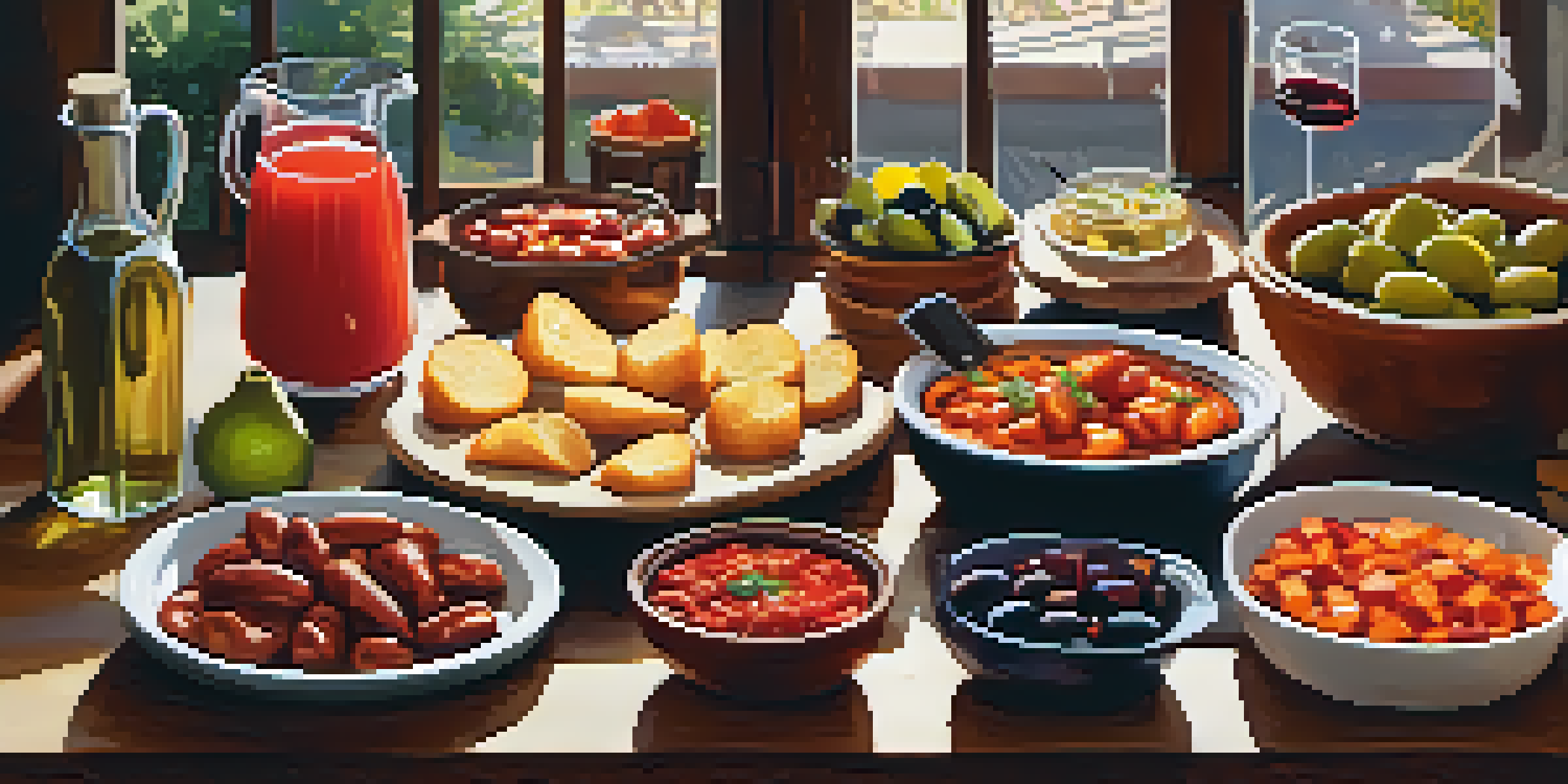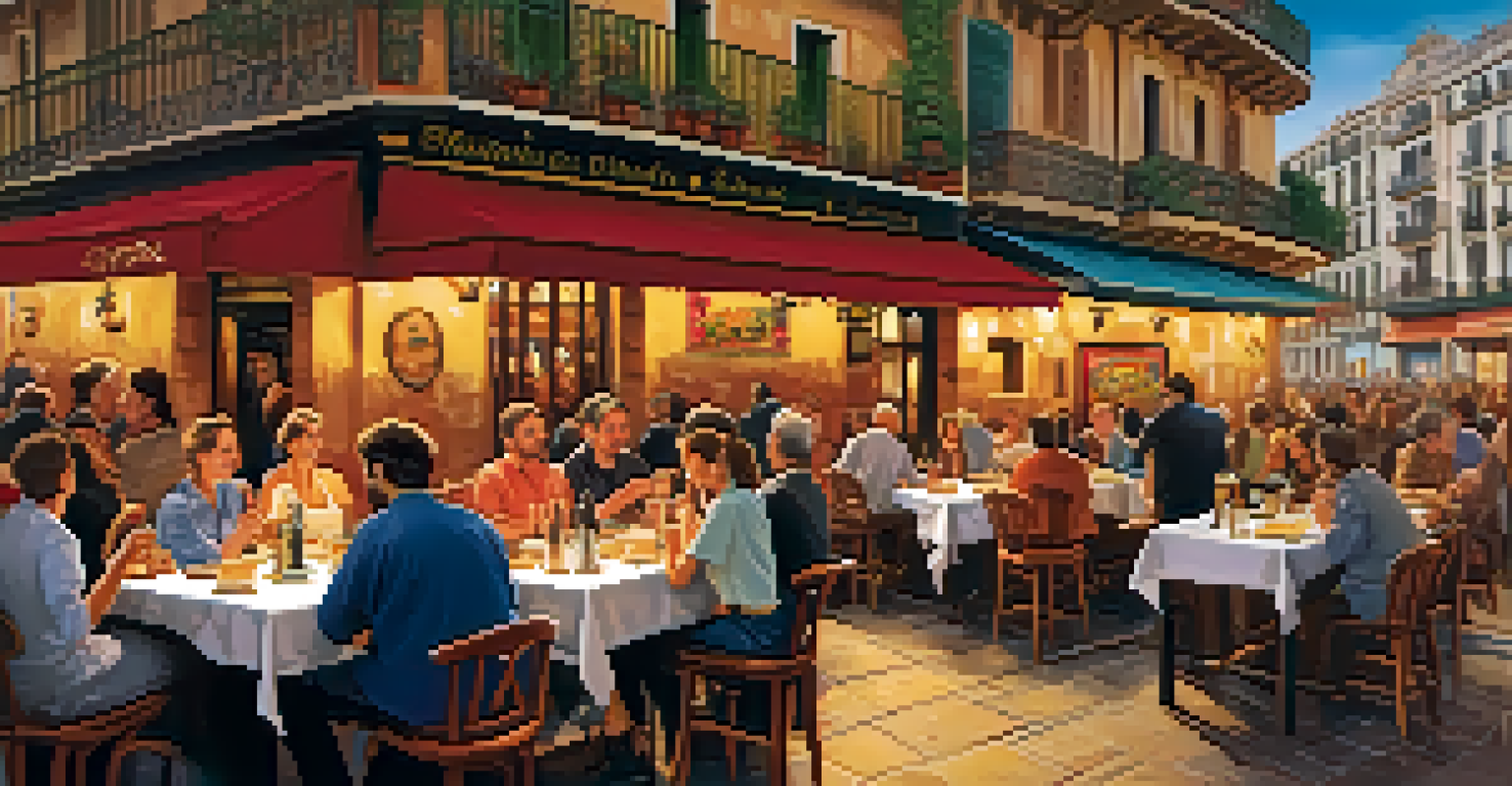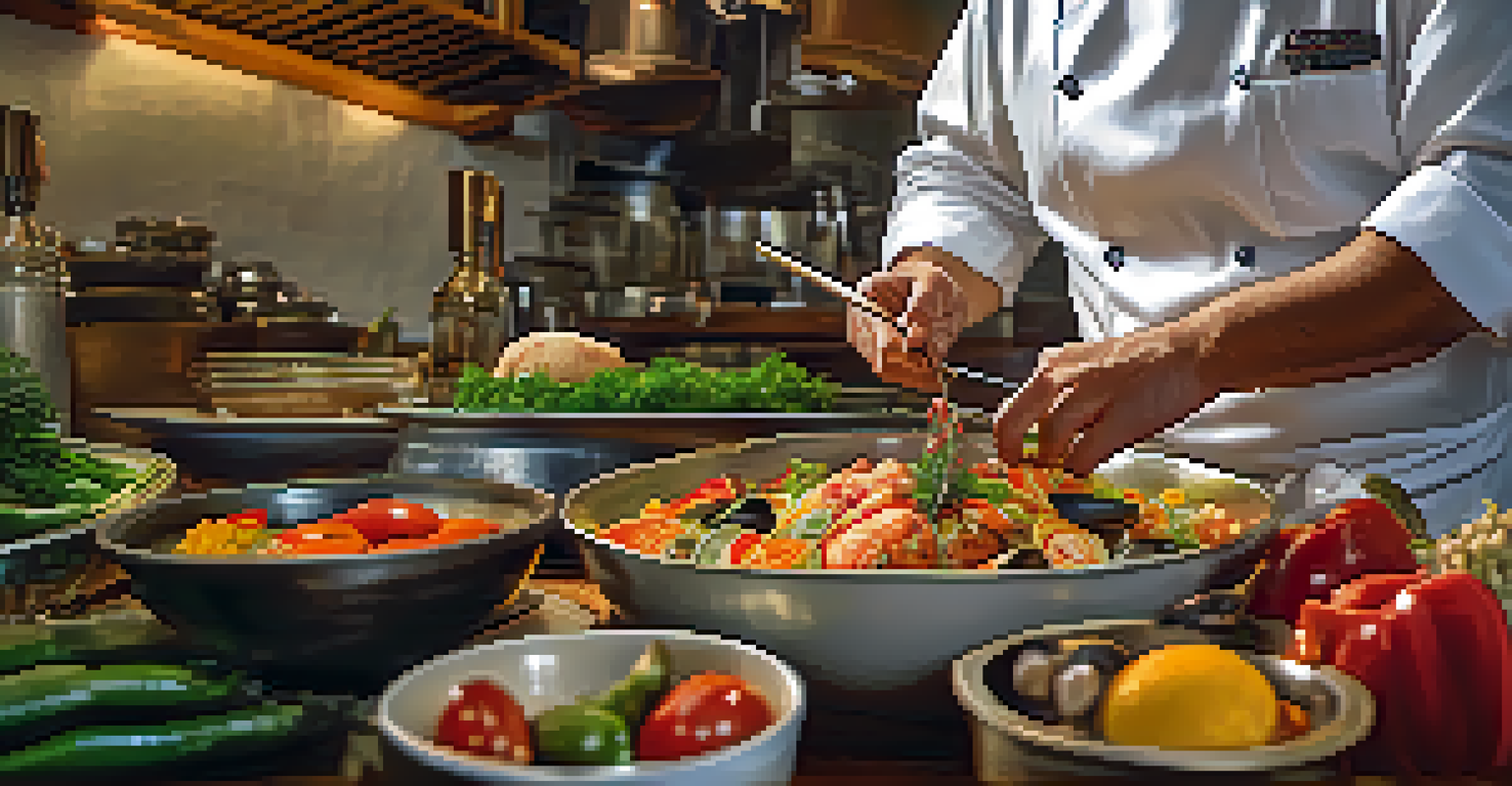Savoring Spain: Tapas Tours in Barcelona and Beyond

What Are Tapas and Their Cultural Significance?
Tapas are small dishes that capture the essence of Spanish cuisine, making dining a communal experience. Originating from the Spanish word 'tapar,' meaning 'to cover,' these bites were traditionally served atop drinks, keeping pesky flies away. Today, tapas represent a culinary tradition that encourages sharing and socializing, bringing friends and families together over flavorful morsels.
Food is symbolic of love when words are inadequate.
In Spain, the enjoyment of tapas goes beyond just the food; it's about the atmosphere and the connections made over shared plates. Imagine sitting at a bustling bar, laughter ringing out as friends clink glasses filled with wine or sangria, all while savoring a variety of savory delights. This vibrant setting makes tapas a beloved part of Spanish culture, enhancing the dining experience.
Whether it's a classic patatas bravas or a more modern fusion dish, each tapa tells a story of regional ingredients and culinary creativity. This cultural significance makes tapas a must-try for anyone visiting Spain, setting the stage for unforgettable food adventures.
Why Barcelona is the Perfect Tapas Destination
Barcelona, with its stunning architecture and lively streets, is a paradise for food lovers. The city's rich history and diverse culture contribute to a vibrant culinary scene, making it the perfect destination for tapas tours. From historic neighborhoods like El Born to the bustling La Rambla, each corner of the city offers unique gastronomic experiences waiting to be discovered.

The variety of tapas styles in Barcelona is astounding. You can find traditional Spanish dishes alongside innovative interpretations that reflect the city’s modern culinary trends. This blend of old and new ensures that each tapas tour provides an exciting exploration of flavors, textures, and presentations that will delight your taste buds.
Tapas Foster Community Dining
Tapas encourage sharing and socializing, enhancing the dining experience in a communal atmosphere.
Moreover, the local markets, such as La Boqueria, provide a sensory overload of fresh ingredients and vibrant colors, enhancing the tapas experience. Walking through these markets not only showcases the best of local produce but also allows you to connect with the local culture, deepening your appreciation for Spanish cuisine.
Top Tapas Tours to Experience in Barcelona
One of the most popular tapas tours in Barcelona is the 'Tapas and Wine Tasting' experience, where you can indulge in a variety of local wines paired with delicious tapas. This tour often includes visits to several authentic bars, allowing you to savor each bite while learning about the region's wine-making traditions. It's a delightful way to immerse yourself in Barcelona's culinary heritage.
Eating together is a form of social bonding; it’s about sharing experiences, stories, and flavors.
Another gem is the 'Gothic Quarter Tapas Tour,' which combines history and gastronomy. As you wander through the narrow, winding streets of this historic neighborhood, you'll stop at hidden gems that serve some of the best tapas in the city. This tour not only tantalizes your taste buds but also fills your mind with fascinating stories of the city's past.
For those seeking a unique twist, consider a 'Catalan Cooking Class.' Here, you can learn to create traditional tapas dishes yourself, guided by a local chef. This hands-on experience is perfect for foodies who want to dive deep into the culinary arts and take a piece of Spain back home with them.
Exploring Tapas Beyond Barcelona
While Barcelona is a fantastic starting point, the world of tapas extends far beyond its borders. Cities like Madrid and Seville offer their own unique takes on this beloved tradition, each with their signature dishes. Exploring these destinations not only broadens your culinary horizons but also allows you to appreciate the regional diversity within Spanish cuisine.
In Seville, for example, you can experience the traditional 'tapeo' culture, where hopping from bar to bar is a way of life. Here, you'll find classic tapas like jamón ibérico and espinacas con garbanzos, best enjoyed in lively taverns filled with local charm. This authentic experience immerses you in the true spirit of Spanish social dining.
Barcelona: A Tapas Paradise
Barcelona's vibrant culinary scene and diverse tapas styles make it an ideal destination for food lovers.
Meanwhile, Madrid boasts its own tapas scene, characterized by bustling markets and vibrant neighborhoods. Don't miss out on trying the famous 'bocadillo de calamares' (fried calamari sandwich) or the delightful 'patatas bravas' at local bars. Each city presents a unique flavor profile, enriching your tapas journey through Spain.
The Role of Local Ingredients in Tapas
Central to the charm of tapas is the emphasis on fresh, local ingredients. Each region of Spain boasts its own specialties, from the seafood of coastal areas to the hearty meats and vegetables found inland. This focus on quality ingredients not only enhances the flavors but also supports local economies and sustainable practices.
For instance, in Barcelona, you might find tapas featuring fresh seafood such as anchovies or octopus, sourced directly from nearby Mediterranean waters. This commitment to local produce shines through in the dishes, making each bite a celebration of the region's rich culinary offerings. It’s a philosophy that many local chefs embrace, ensuring that the essence of Spain is captured on every plate.
Moreover, seasonal ingredients play a significant role in tapas preparations. Many tapas bars change their menus frequently to highlight the best produce available at different times of the year. This not only keeps the dining experience fresh and exciting but also encourages diners to explore and enjoy the seasonal bounty of Spanish cuisine.
The Best Drinks to Pair with Tapas
No tapas experience is complete without the perfect drink to accompany your meal. In Spain, wine is a natural choice, particularly regional varieties such as Rioja from the north or Cava, a sparkling wine from Catalonia. These beverages complement the flavors of the tapas beautifully, enhancing your overall dining experience.
Another popular drink to enjoy with tapas is vermouth, a fortified wine that has seen a resurgence in popularity. Sipping on a chilled glass of vermouth, often served with a slice of orange and an olive, is a delightful way to unwind while sampling various tapas. It embodies the relaxed, social atmosphere that tapas culture promotes.
Local Ingredients Elevate Flavors
The use of fresh, local ingredients in tapas not only enhances flavors but also supports sustainable practices.
And let's not forget the classic sangria, a refreshing blend of wine, fruit, and sometimes a splash of brandy. This fruity concoction is perfect for group gatherings, making it a staple on many tapas tours. Pairing your tapas with the right drink can elevate your meal, turning it into a memorable celebration of flavors.
Tips for Enjoying Your Tapas Tour
To get the most out of your tapas tour, it's essential to approach it with an open mind and a hearty appetite. Be adventurous! Don't hesitate to try dishes you've never encountered before—this is the spirit of tapas dining. Each dish is an opportunity to explore the rich tapestry of Spanish flavors and culinary traditions.
Also, pacing is key. Tapas are meant to be enjoyed leisurely, so take your time to savor each bite and sip. Engage with your guide or fellow diners, sharing thoughts on what you love about each dish. This interaction will enhance your experience and might even lead to discovering new favorites.

Finally, remember to ask questions! Whether you're curious about the ingredients, the preparation methods, or the stories behind the dishes, the local chefs and guides will be more than happy to share their knowledge. This not only enriches your understanding of tapas but also deepens your connection to the vibrant culture of Spain.